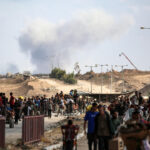A state audit has uncovered a massive scandal in the Democratic Republic of Congo’s mining sector, revealing that companies failed to declare nearly $16.8 billion in revenue between 2018 and 2023. The findings, released in October by the Court of Auditors, expose widespread underreporting and non-compliance among mining giants operating in one of the world’s richest yet poorest countries. According to the report, while companies declared $98.2 billion in earnings to tax authorities, they reported only $81.4 billion for community development contributions, resulting in a shortfall of $16.8 billion and an estimated $50.4 million loss in payments to local development funds.
Under the 2018 Mining Code, mining firms are mandated to allocate 0.3% of their annual revenue to community development funds that support essential projects such as schools, hospitals, roads, and clean water systems. These funds are critical to ensuring that the wealth generated from Congo’s vast mineral resources benefits local populations living in mining areas. However, the audit suggests that the majority of companies ignored these obligations, depriving communities of vital infrastructure and deepening public mistrust in the sector.
Several major international producers of cobalt and copper—two minerals essential for electric vehicle batteries and renewable energy technology—were named in the report. Among them were subsidiaries of Glencore and China Molybdenum Company (CMOC), both of which are among the largest exporters of cobalt globally. The report alleged that these companies underreported their revenues by more than $10 billion collectively. Glencore’s Kamoto Copper Company denied wrongdoing, claiming it had fully complied with the law and attributing discrepancies to “differing interpretations” of the Mining Code’s effective date. CMOC did not respond to requests for comment.
The Congolese government has expressed outrage at the findings. Attorney General Jean Chris Mubanga Musuyu said that nearly 70% of companies operating in the mining sector failed to comply with the revenue-sharing rule, calling it a “significant loss of national income.” The Court of Auditors has urged authorities to suspend non-compliant companies and initiate legal proceedings against those found guilty of concealing revenue. It also called for stronger coordination between the Ministry of Mines, the tax authorities, and local development committees to ensure transparent reporting and better management of the funds.
Civil society groups have joined the chorus of criticism, emphasizing that the community development levy was designed to transform mining from a purely extractive industry into a driver of social progress. “These funds are meant to build schools, roads, and hospitals,” said a representative from the Congo Natural Resources Observatory. “Every dollar withheld is a dollar stolen from the Congolese people.” Activists argue that unless these companies are held accountable, mining will continue to enrich foreign corporations and a small political elite while leaving the Congolese population mired in poverty.
The Democratic Republic of Congo is home to over 70% of the world’s cobalt reserves, as well as large deposits of copper, gold, and diamonds. Despite this immense wealth, most citizens live on less than $2 a day, and access to basic amenities such as electricity and clean water remains limited. The audit findings highlight the long-standing governance failures and lack of transparency that have plagued the country’s natural resource management. Economists warn that such systemic corruption undermines development goals and discourages legitimate foreign investment.
Observers say the audit presents a crucial opportunity for the government to strengthen oversight and restore public confidence. By enforcing transparency, improving regulation, and ensuring that mining revenue directly benefits communities, the DRC could begin to change its reputation as a country rich in resources but poor in outcomes. “This audit is a wake-up call,” said economist Alain Kabeya. “The Democratic Republic of Congo cannot continue to lose billions while its citizens remain in poverty. True reform begins with accountability.”
As the government considers the recommendations of the Court of Auditors, international attention is focused on whether this moment will spark real reform or become another missed opportunity. The DRC’s handling of this scandal will not only determine the fate of its mining sector but also signal whether the nation can finally turn its mineral wealth into meaningful development for its people.













Leave a comment